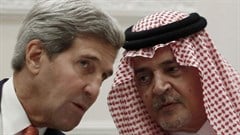
Saudi Arabia’s recent North Korea-like cry for US attention — announcing it was downgrading ties with its most important ally — was all just drama for the camera. US Secretary of State John Kerry answered the plea of a weepy ally and again rushed to the Middle East to hold hands with his Saudi counterpart, Saud al Faisal. The ties have been mended, it seems, all is forgiven.
The Saudis were miffed that the hundreds of millions of dollars they spent to overthrow Syrian president Assad have not done the trick, and that in light of their failure the US had not taken up their fight in a more assertive manner. A last minute US pull-back from war, brokered by the Russians, left the Saudis without any muscle to back up their money.
But the seeming early success of US talks with Iran was the last straw.
The Saudis announced they were sending a harshly-worded message to Washington: they would reject the UN Security Council seat they had secured by hook and by crook and they would pour cold water on US ties. John Kerry came running. Kerry assured his Saudi friends that nothing had really changed in Washington; that this brief flirtation with diplomacy was just a youthful indiscretion and that soon business as usual would break out as usual.
There could be “no role” for Syrian president Assad in Syria’s future, Kerry assured the Saudis, adding that “Assad has lost all legitimacy, and he must go.” Even as the insurgents in Syria continue to pledge their loyalty to al-Qaeda-linked militias — and the so-called moderates continue to melt away — Kerry promised that the US would “continue to support the opposition” in Syria, just like the Saudis.
His Saudi counterpart was impressed, citing Saudi Arabia’s concern for “human values” as the basis for its effort to back insurgents in Syria.
Well known for support of human rights at home, the Saudi foreign minister argued for his government’s promotion of human rights abroad:
“We can’t really say that we are taking the high road and establishing our humanity if we let this tragedy continue unabated.”
Syria policy is all based on Saudi values, it seems.
At their meeting, Kerry also assured the Saudis that US policy toward Iran “has not changed.”
And with much of the Congressional battlefield having been softened by assaults from the powerful Saudi and Israeli lobbies, who work in tandem (but we are not supposed to notice) on these issues, it appears that after a brief flirtation with diplomacy and multilateralism, Washington is preparing to return to the status quo. Congress will double down on Iran sanctions, entertain war authorization legislation, and push harder for regime change in Syria. The president, who it seems takes pride in being “really good at killing people” will continue to practice his hobby.
Will too much water have passed under the bridge for this return to status quo to work? Let’s wait and see.
